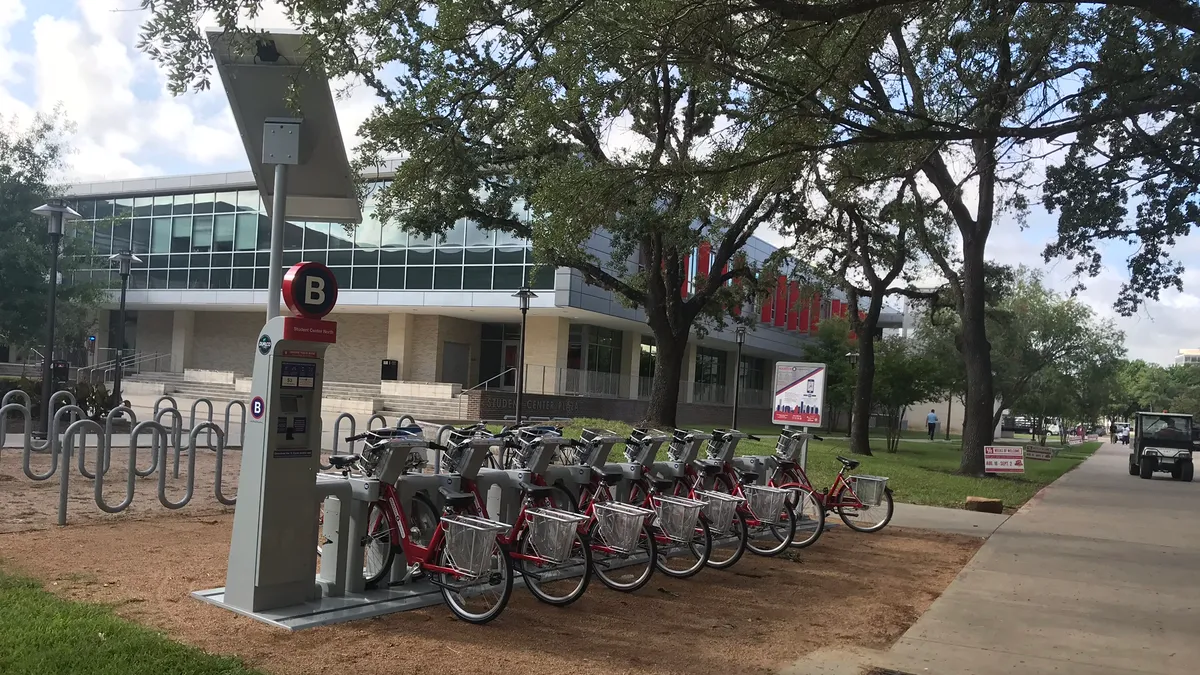Bike-sharing's future in Houston remains uncertain after Houston BCycle, the city's bike-share network, shut down at the end of June. Houston is now the largest U.S. city without a bike-sharing network.
"This is the thing that we feared a year ago," said Joe Cutrufo, executive director of cycling advocacy nonprofit BikeHouston.
In October 2022, Houston Bike Share, the nonprofit that ran Houston BCycle, informed the city; Harris County, Texas; and the Metropolitan Transit Authority of Harris County, commonly known as Houston METRO, that it would be unable to operate the city's bike-sharing network amid falling revenue, rising costs and worsening infrastructure. In fiscal year 2022, BCycle lost more than $100,000, which did not include nearly $221,000 in depreciation expenses, according to BCycle's most recent annual report.
In January 2023, Houston METRO's board approved a measure to transfer BCycle's operations from the nonprofit to the transit agency, with a greater emphasis on providing first- and last-mile connections to the city's transit system. But months later, METRO decided against taking over BCycle in lieu of creating an all-new system with fewer stations.
In September 2023, the chair and vice chair of Houston BCycle's board of directors published an op-ed in the Houston Chronicle stating that Houston Bike Share would soon wind down its operations because the organization had become financially unsustainable. They said the system's operating expenses grew faster than revenue as BCycle expanded to meet the city's transportation needs rather than focusing primarily on recreational riders, which comprised 90% of its users, Community Impact reported in January 2023. BCycle's annual ridership peaked above 300,000 as the system once operated more than 150 stations, 2,200 docks and 900 bikes across 150 service miles, according to BCycle's most recent annual report.
In September 2023, the Houston City Council approved $540,000 in funding for Houston Bike Share to continue operating BCycle. At the time, then-Mayor Sylvester Turner said the funding would keep the system operating for a year. The expectation, according to news reports, was that METRO’s new bike-sharing network would be up and running within six months. To that end, Houston METRO's board unanimously approved a five-year, $10-million contract with PBSC Urban Solutions, a Lyft subsidiary based in Canada, that same month to help build a new bike-sharing system that would open with an initial 20 stations in 2024 and expand to over 100 stations by the end of the contract.
Despite that approval, METRO has not signed an agreement with PBSC Urban Solutions, and it's unclear whether the transit agency will proceed with the plan its board approved last fall.
What changed?
Houston's new mayor, John Whitmire, who took office in January, has viewed pedestrian and cycling infrastructure investments more skeptically than his predecessor. Turner supported BCycle's expansion and creating a METRO-operated bike share system. In his first months in office, Whitmire has removed pedestrian islands and frozen bike lane-related projects. With four of METRO’s nine board members recent Whitmire appointees, some pedestrian and micromobility advocates are worried the transit agency will abandon its plans for bike-sharing.
In April, METRO's interim President and CEO, Tom Jasien, told Houston Landing that the agency was still reviewing its bike-sharing options, including potential partners. However, the agency has not announced if or when it will launch a new bike-sharing system. Jasien has questioned whether METRO should support a system used primarily for recreation, not transit.
Jennifer Ostrind, interim director of the city's Planning and Development Department, said her agency will work with METRO on its micromobility plans but that "it's going to take a little bit of time to get there."
In the meantime, city officials are removing and cleaning up BCycle's now dormant bike-share infrastructure, she said. The city plans to sell the equipment to other bike-sharing systems or dispose of it.
BikeHouston's Cutrufo said cyclists must rely on other transportation options while the city figures out its bike-sharing plans.
"They were supposed to have a system up and running by the time BCycle would be sunsetting, and those bikes haven't even been built yet," Cutrufo said.
The lack of a suitable replacement for BCycle can create significant hardship for riders who previously relied on it for regular transportation, bike-sharing advocates and former BCycle employees said.
“I hope that this void is filled soon for program employees and riders. This great city deserves an accessible, sustainable bike-share program," Doogie Roux, a micromobility consultant and former director of operations at Houston Bike Share, said in an email.
BikeHouston and other cycling advocates are encouraging METRO to implement the plan its board approved in September.
"The reason we will have a gap in the bike-share system is that bike-share coverage is squarely in the hands of METRO," Cutrufo said. "METRO needs to be able to show that they're not [going] to pull a fast one on bike-share riders by reneging on this contract.”



















